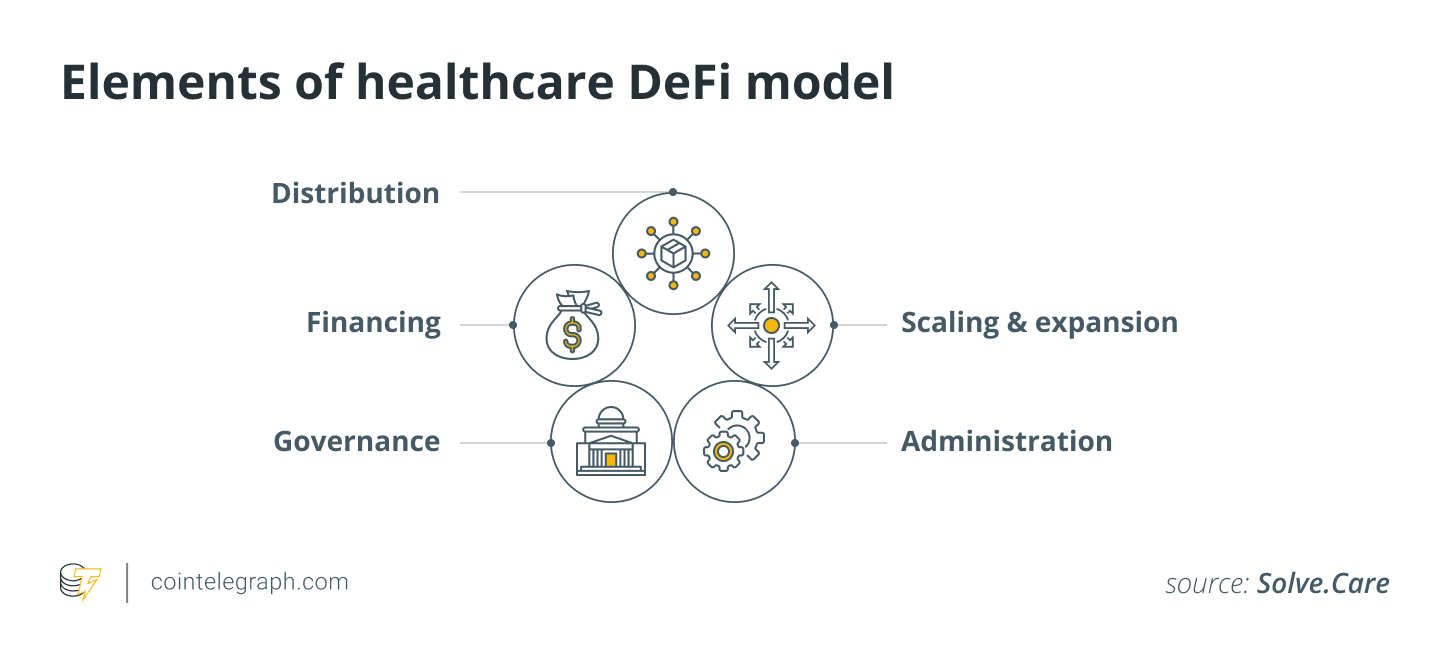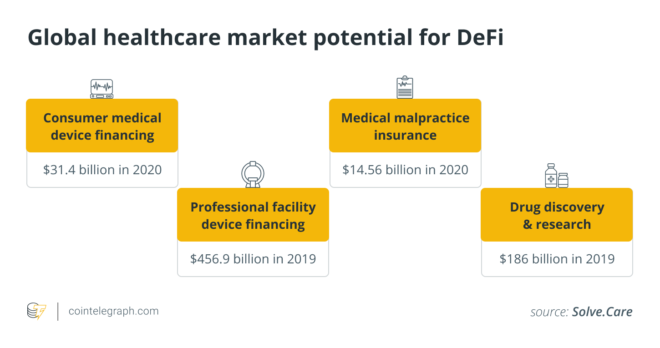With today’s technological and medical advancements, quality, affordable healthcare should be a basic human right: healthcare for every single person, no matter their socioeconomic level or geographic location.
The global size of the healthcare market was worth over a staggering $8.45 trillion in 2018 and continues to grow. With the onset of the COVID-19 pandemic, it’s well known that medicine is moving online and going digital. But how is this related to decentralized finance? The decentralized finance community is rapidly growing but is currently still in its early stages with the focus primarily on yield farming.
Related: How blockchain will revolutionize healthcare
The DeFi space has been carefully analyzed and represents a huge market potential if properly applied to healthcare. A very interesting opportunity arises if the key principles of DeFi — community-governed, community-funded, transparent and with intermediaries eliminated — are applied to healthcare.
For example, the medical device financing and leasing market segment for patients and professionals alone is well over $450 billion per year, and there is no centralized finance solution or DeFi solution that is easy, accessible and global. There is no one offering a global solution for this; no banks, no insurers, no government agencies — no one. One thing is clear: There is a real need, real hunger and massive growth potential driven by the COVID-19 pandemic and the changing landscape of healthcare and its intersection with DeFi.
Related: Opportunities for blockchain-based technologies in African healthcare
Working closely with the medical community on projects such as Global Telehealth Exchange and Diabetes Care Network, we have learned that there is an even further growing and urgent need to monitor patients who are spread out globally. And because of that, there is a real opportunity to provide a much-needed simple, fast financing solution for medical monitoring devices that is globally accessible to both doctors and patients.
But the opportunity does not just stop there. It is not just medical device financing that would greatly benefit from DeFi. The healthcare market is huge — staggeringly huge. Below are just a few examples of healthcare market segments, and what they are worth, in which DeFi could be applied.
Today, the DeFi market is worth approximately $8.9 billion. But when intersected with healthcare, it would not be an exaggeration to say that it has the potential to exponentially grow into the trillions! The professional facility and device financing market alone is worth more than 50 times that. There is a real-world need for DeFi for healthcare, which will be a community-governed, community-funded, highly scalable, globally useful solution.
Related: A minister’s look at healthcare: Providing fertile ground for blockchain innovation
The way forward
Moving forward, DeFi should be governed and applied to healthcare so that it is scalable, sustainable, community-governed and community-funded. To achieve this, a framework will be needed for governance, constitution, tokens, pools, and the financing of healthcare products and clients. It should then be turned over to the community to scale, grow, expand and benefit from.
This should serve as a model that works for real doctors and patients and can launch many other DeFi projects for healthcare. And the objective is to create a DeFi standard for healthcare that can be made available globally and serves the immediate opportunity but can be scaled to address other opportunities.

DeFi will absolutely help deliver better health outcomes for more people and remove barriers to quality care for anyone, anywhere in the world. DeFi for healthcare is upon us, and the opportunity is there for the taking.
The views, thoughts and opinions expressed here are the author’s alone and do not necessarily reflect or represent the views and opinions of Cointelegraph.
Pradeep Goel is the CEO of Solve.Care. With over 25 years of experience in healthcare, Pradeep has worked with two U.S. presidential administrations on implementing Medicare and Medicaid programs, the Affordable Care Act, and other government programs. At Solve.Care, he and his international teams have designed and implemented a blockchain platform to improve care coordination while cutting healthcare waste, fraud and administrative burden.




